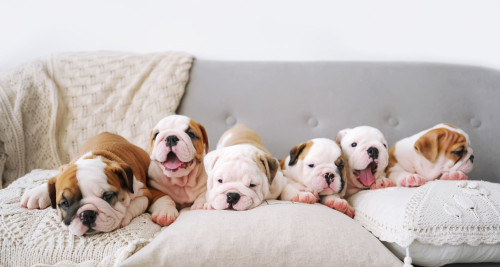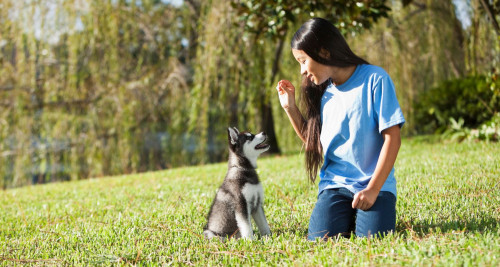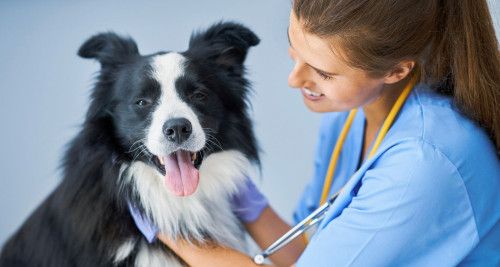Goldendoodle
Breed Traits and Characteristics
According to the Daily Paws, here are some breed characteristic you can find in Goldendoodles.
- Height
17-21 inches
- Weight
50-90 pounds
- Life Expectancy
10-15 years
- Coat Type/Length
Curly/Medium
-
100 Affectionate with Family
-
100 Good with Young Children
-
100 Good with Other Dogs
-
100 Trainability Level
-
80 Energy Level
-
40 Barking Level
-
20 Shedding Level
-
20 Drooling Level
History
Known as Golden Poos, Goldie Poos, or Groodles, this breed has a short history. There is conflicting information on where this breed originated, with some saying Canada or Australia. We do know they became popular in Australia in the 1980s, and appeared in North America in the 1990s. As pet owners were looking for a larger dog that was allergy free, a Golden Retriever was bred with a Standard Poodle and instant fame!
The original designer breeds came into being when it was discovered that recipients of dogs used as ‘seeing eye’ and ‘service dogs’ were allergic to pet fur, so a dog that does not shed was sought.
Since Goldendoodles are not pure bred and are cross-bred, they are not recognized by the American Kennel Club as a breed of its own. This hybrid dog is recognized by the American Canine Hybrid Club, Designer Dogs Kennel Club, Dog Registry of America, Inc., International Designer Canine Registry and Designer Breed Registry. After seven generations have been bred, the Goldendoodle will become eligible for purebred dog registries.
The Goldendoodle
This month’s medium-sized breed -The Goldendoodle - continues to hold popularity with many dog lovers because of its intelligence.
They are referred to as “toy dogs”, “hybrids” or “designer dogs”. Relatively new on the scene, Goldendoodles made their debut in the United States and Australia in the 1990s and have quickly grown in popularity. Why? They are a cross between a Golden Retriever and a Poodle, two well-loved breeds that are adorable and smart.
Golden Retrievers are known as loving, friendly dogs. Poodles are considered to be one of the smartest breeds. No wonder that a cross between these two would be desirable! Additionally, because the poodle is considered hypoallergenic, the Goldendoodle is a great choice for people who are only mildly allergic to dogs.
Bark Busters has recently trained “oodles of doodles”. Before you go head-over-heels for your Goldendoodle and totally spoil him/her, know that they have behavioral issues that come with their breed, naughtiness and stubbornness being two personality traits. You have to remember that your Goldendoodle will have the traits of both the Poodle and the Golden Retriever, both generally stable breeds, but sometimes the mix of the two is a cocktail of rowdiness and willfulness. Nothing that dog training can’t overcome!
Goldendoodle Breed Facts
Physical Characteristics
Goldendoodles vary in size and physical appearance, depending if they look more like a Golden Retriever or a Poodle. You will see longer, shaggy-haired versions or a shorter, curlier hair type. When the fur is not cut, it will grow 4 – 8 inches in length and can grow long around a Goldendoodle’s eyes. Therefore, it needs to be clipped regularly so your dog can see! These adorable fur kids come in a color selection that is large -- cream, gold, apricot, chocolate, gray and black.
Standard Goldendoodles weigh 45 – 100 pounds, medium size weigh 30 – 45 pounds, and miniature weigh 15 – 30 pounds (mom or dad being a toy poodle).
When we say that Goldendoodles are “designer dogs”, we mean they are first generation hybrids. If they are bred from a purebred poodle and a purebred Golden, this is known as “hybrid vigor”. This means you get the best characteristics of both of the breeds and are thought to be even healthier than their pet parents.
Personality & Temperament
Goldendoodles are so popular because they have the easy going, friendly nature of the Golden Retriever and the brains of a Poodle. They are so cute it is hard to resist their enthusiasm. Because they are so social, separation anxiety can be a big issue with this breed.
- Affectionate
- Desire to please
- Kid friendly
- Great for people with mild dog allergies
- Light shedder but requires regular grooming and clipping
- Likes being indoors with people versus isolated outdoors in a kennel
- Highly intelligent
- Gets along well with humans and other pet
- Good dog for first time pet owners
- Both the Retriever and the Poodle are in the top 5 in terms of intelligence. The Poodle is #2, while the Golden Retriever is #4… they are brainiacs!
Capabilities
Goldendoodles are extremely empathetic and really want to assist people who need a helping hand … or paw! Their extreme loyalty and gentle nature and quickness in learning make them ideal to be service dogs. They also make great therapy and guide dogs and can make wonderful companions for:
- Blind or persons with vision impairment
- People in nursing homes
- Elderly hospice residents
- Hospital patients
Goldendoodle Common Behavioral Issues
Everybody is a friend to a Goldendoodle and they thrive when they are around people. Conversely, they do not like to be alone for long periods and will become destructive if they aren’t getting the attention they need. Goldendoodles can have a hard time with separation anxiety.
If your Goldendoodle is bored, you’ll know it because the destruction begins. This is when dogs tend to misbehave the most.
It is important not to spoil your Goldendoodle too much to the point where you accept misbehaviors. It’s hard when they look like adorable teddy bears, but there is a major difference between loving and spoiling your dog. They do not do well with aggressive, harsh training because they are very sensitive. Goldendoodles respond best to positive reinforcement. They live for belly rubs and sloppy kisses. Bark Busters does not believe in negative reinforcement because too often, aggression breeds aggression.
Goldendoodle issues can include:
- Aggression
- Boredom
- Destructive behaviors like mouthing, nipping, chewing
- Difficulty in house training
- Hyperactive
- Jumping
- Not coming when called
- Play biting
Always choose a reputable breeder and ask for references. Because Goldendoodles are a “designer dog”, they can often cost a pretty penny. That’s why we suggest looking at rescues, animal welfare shelters and the local Humane Society or RSPCA. These dogs are tested for temperament and soundness.
If you want a “miniature Goldendoodle”, make sure one of the parents is a toy poodle or you will have a much bigger dog on your hands than you expected.
Remember your dog is only as good as you are as a role model. As a medium dog expected to live 15 years or more, it’s important you provide your Goldendoodle not only with the basics, but you meet all his/her needs mentally, physically and psychologically.
Goldendoodles are generally indoor dogs who like to be near their family. If you want an outdoor dog that is independent (like a German Shepherd), a Goldendoodle is not for you.
Goldendoodles love human companionship and bond very strongly with their owners. Goldendoodles will find ways to entertain themselves, so it is important to provide them with enough chewing toys and good training before leaving them for any amount of time.
Your Goldendoodle’s energy is boundless. To keep him out of trouble, you and your kids must provide plenty of time to play. If you’re not going to be around, it’s important to give your Goldendoodle something to do like playing with a Kong or an interactive toy. If you’re out and about, leave the radio or TV on tuned to Animal Planet or your dog will feel very isolated.
Because Goldendoodles are so active, you have to be very wary of them running away.
Training Your Goldendoodle
If you have a Goldendoodle, you have your hands full. They have boundless energy and a hard time focusing. They can be extremely naughty and mischievous and well known for chewing, nipping and mouthing everything in sight! And door manners? They never heard of them.
Dogs learn how to communicate with others when they are first born, mimicking their mom and siblings. This is what is known as the “pack mentality”. Suddenly you adopt them into your home and you start speaking a language they don’t understand. Dogs don’t converse with each other with prong or shock collars or even treats. That’s why our Bark Busters trainers teach pet owners how to communicate with dogs the natural way – with voice tones and body language. We call it “speaking dog”.
The best time for training is as a puppy. You are going to need a lot of patience because consistency will be the key. Just when you think they have the “sit” command down pat, something will catch their attention and off they go. It is important for pet parents to establish themselves as the “leader of the pack” and the “Top Dog”. Your Goldendoodle will vie with you for control, and if you give an inch, he will take a mile!
Your dog will quickly learn the pecking order of the pack and look for the weak links. He will constantly question your authority and attempt to move himself higher up in the pack.
Because of their high energy, Goldendoodles need a lot of mental and physical stimulation. Multiple walks/day and some interactive toys such will help. Goldendoodles will shadow you everywhere you go and don’t like to be left alone. If you’re going to work or will be gone for the day, make sure you leave them with things to do or their destructive behaviors will kick in out of boredom.
One word of advice: Although great family companions, Goldendoodles are not good watch dogs so don’t put them in a guarding situation.
Connect with Us!
Need help training your Goldendoodle? Call 1-877-500-BARK (2275)or enter your zip code.
Bark Busters Trainer Michael Konstantaras on Goldendoodles
My friends sometimes refer to me as "the Doodle King" because of how many Goldendoodles (and various other "Doodle" breeds) I've worked with. I'd estimate I've worked with somewhere between 600-800 over the years. As with any breed, there isn't a cookie cutter answer to describe their traits or characteristics, but I'd describe them generally as being very responsive to training and dogs that make wonderful family members.
Many of my clients hire me when their dogs are puppies between 8-10 weeks old when they first arrive to their home. Doing this will definitely make life easier, for you can educate and train your pup to whatever rules your particular home may have, at a young age. However, I'm more often hired to help clients with adult Goldendoodles with various behavioral issues.
As with any breed, without proper guidance and leadership, many of these cute fluffy pups can bark excessively, become aggressive towards guests, and even towards their own family. Also, if left unattended for long periods of time, either in a crate or elsewhere, Goldendoodles may become destructive and suffer separation anxiety.
Being a very popular breed, people considering getting a Goldendoodle should do their homework and get one from a reputable breeder. Be very cautious about buying dogs online without seeing the puppies’ environment and parents. Dogs bought from puppy mills who have no regard for health and disposition may have serious health and behavioral problems. The good news is that Goldendoodles respond great to training and are eager to learn and change. If you're an owner with an adult Goldendoodle, it's never too late to get help. Yes, you can teach an old dog new tricks! Goldendoodles are definitely active, sporting dogs so be sure that your lifestyle can accommodate the exercise and attention needs of such a smart, athletic dog.
In summary, when I get a call from a client with a Goldendoodle, I'm so happy that they found me because I'm confident that, with even one lesson, I can make an incredible change in that family's life. Once a client learns how to communicate to their Goldendoodle in a way it actually understands, the sky's the limit with what Goldendoodles can be trained to do.
Bark Busters Trainer Jeff Drier on Goldendoodles
Goldendoodles are a cross between Golden Retrievers and Poodles and usually share some of the best characteristics of each of those breeds. They are often highly intelligent, energetic, friendly, and outgoing; hence their popularity with active families. They want to be included in all the activities, but they also need to learn how to follow instructions or their enthusiasm can get them in trouble.
Bark Busters trainers are often called to help the families of these dogs, usually due to their over exuberance. Jumping on people, pulling on leash and not coming when called are common issues Bark Busters Trainers help the families of Goldendoodles address.
Usually these issues are easily taken care of as Goldendoodles are smart and want to please and fit in. As adorable as they are, like all other dogs, they need an education to learn how to be good family members. Many of these dogs can be great therapy dogs once they outgrow their puppy exuberance.
As with Golden Retrievers, their bodies mature faster than their brains and they often aren’t fully mature until they are two years older or even older. Starting their education as soon as you bring one home and making education a part of the normal routine will help them. Bark Busters trainers are experts at helping families develop a game plan for teaching these enjoyable dogs everything they need to know to be the great family members they can be. Their moms and siblings taught them how to live with dogs, it’s up to us to teach them how to live with people. It is a great way to increase the bond with them as they love learning. Exercising their brains will help them be calmer and as they are high energy dogs to begin with, that’s usually a good thing.
If you are considering getting a Goldendoodle, do your homework, find a reputable breeder and contact your local Bark Busters trainer so you can get started teaching it right away. If you aren’t controlling the education, your puppy will and only you know your family and your visions. Only you can teach your pup how to be the wonderful companion and family member they can be.
Goldendoodle Health
Common Injuries and Illnesses
Your Goldendoodle’s health concerns will change over the course of their life. A puppy might be more prone to eating something they shouldn’t, a 2-year-old Doodle may be more likely to show signs of allergies, and a senior Goldendoodle is far more likely to develop a mass as they age. Goldendoodle’s also have personality and physical traits that may make them more prone to certain conditions—this breed can be particularly playful, curious, and rowdy, and they can get into things they shouldn’t and injure themselves along the way.
At any stage of life, here are some of the most common injuries and illnesses you should be aware of when bringing home a Doodle:
- Bloat
- Addison’s disease
- Heart disease
- Allergies
- Eye problems
- Skin conditions
- Hip and elbow dysplasia
- Ear infections
If you are ever concerned about your dog’s health, your local veterinarian is a great resource—no matter how small the question.
Genetic Health Concerns
Despite being a hybrid of two breeds, the Goldendoodle has its fair share of hereditary based issues inherited from the Poodle and Golden Retriever. These include things like Addison’s Disease and hip dysplasia. Most reputable breeders now have their breeding stock checked and scored for these hereditary ailments by a veterinarian. You can request proof that the puppy you are purchasing comes from parents that have been checked for these issues.
Because many other health issues are also hereditary, you should do some research on the ancestry of your puppy and any health issues of that particular breed.
Tips for Every Dog Owner
Hear from Bark Busters Clients Who Have a Goldendoodle
Need Dog Training Assistance with Your Goldendoodle? Find Your Local Trainer Now!
CALL TODAY 1-877-500-BARK (2275)








